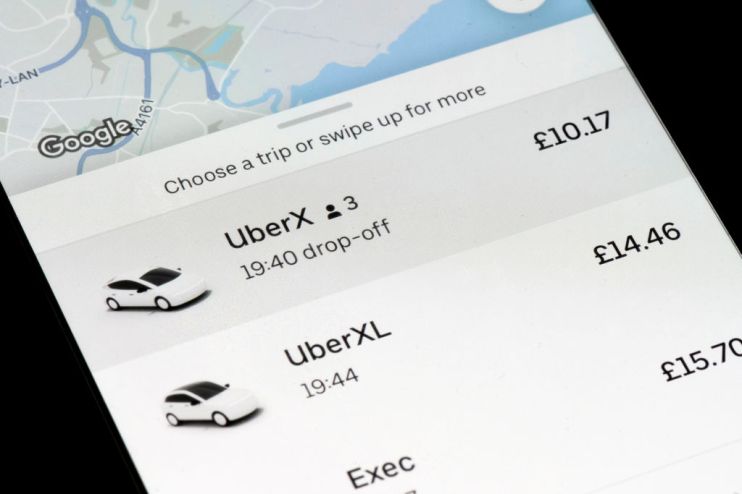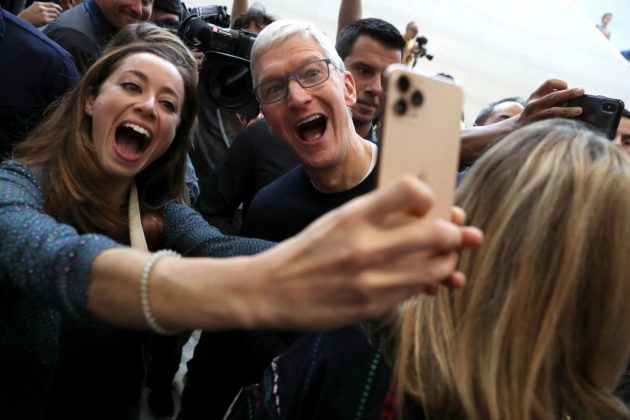Screenshot: Is Uber nearing the end of the road?

This week
**Media Moment of the Week: Boris’ career coaching
**Is Uber nearing the end of the road?
**Apple’s merger madness
Media Moment of the Week: Boris’ career coaching
Social media is a fickle beast, but if there’s one sure-fire way to generate outrage it’s to insult journalists. That’s what Boris Johnson did this week, inciting the righteous fury of every hack up and down the country.
What’s interesting here, though, is not the PM’s criticism of the media, but rather a rare moment of self-reflection. “You feel sometimes a bit guilty,” said the man who has used racist language in his column, was sacked from the Times for making up a quote and once plotted to have a reporter beaten up.
Is Uber nearing the end of the road?
After five years dragged through the courts, the legal battle over the rights of Uber drivers is finally over. For the San Francisco-based ride-hailing app, though, the troubles are only just starting. In its judgement last week the Supreme Court ruled that Uber drivers should be recognised as workers, meaning they are now entitled to the sorts of basic employment rights (such as minimum wage and paid holiday) that the US tech giant has been so determined not to provide. The implications for Uber — or the wider gig economy — are hard to overstate.
The definitely-not-a-taxi company is now facing a tide of similar claims from the 60,000-odd Uber drivers in the UK, tying it up in further courtroom battles and potentially leading to millions of pounds in payouts for backdated holiday pay. Efforts by Uber’s regional manager Jamie Heywood to downplay the ruling, widely seen as an attempt to obfuscate the situation and deter further legal challenges, have only added fuel to the fire. Then there’s the potential VAT bill — Uber escaped the tax on its fares because it argued its drivers were “independent contractors” — which has been estimated at more than £2bn.
But the court case is not a temporary hit. In fact, it could spell the end of the road for Uber — at least in the UK. Aside from the additional costs of providing workers with rights, the ruling confirmed that drivers should start earning as soon as they log onto the app, not just when they are carrying passengers. This would pose a fundamental threat to Uber’s business model and rack up costs that would inevitably be passed to the consumer through higher fares. Its ability to compete with rival ride-hailing firms such as Kapten, Ola and Bolt, would then be in serious doubt.
Then there’s the ever-looming threat from Transport for London and Uber sceptic Sadiq Khan. TfL has twice stripped Uber of its licence and, although the second ban has now been overturned, the verdict will provide fresh ammunition for the Silicon Valley firm’s enemies.
While Uber doesn’t disclose its revenue in the UK, London is its biggest European market and one of its top five cities worldwide for bookings. The company has previously warned that a loss in the UK court case would force it to “fundamentally change” its business model. The shake-up may not be limited to Britain, either, after the European Commission this week launched a consultation into how to improve conditions in the gig economy.
Uber won’t go down without a fight. The backlog of legal cases will take months to resolve, and boss Dara Khosrowshahi has already begun lobbying the EU. Nevertheless, Uber’s future looks for the first time to be under genuine threat, and its fate will reverberate through the entire gig economy.
Apple’s merger madness

While it’s no secret that Big Tech likes to splash the cash on mergers and acquisitions, sometimes it takes a glimpse into the scale of dealmaking in Silicon Valley to really hammer the point home. That came this week from Apple boss Tim Cook, who revealed his company has made more than 100 acquisitions over the last six year — that’s a new company every three to four weeks. Aside from making everyone else feel unproductive, Apple’s figures also shed some light on how its approach to acquisitions has differed to its rivals, as well as what’s in store for the future of tech M&A.
Unlike its fellow Silicon Valley denizens, Apple has veered away from big-ticket deals. Obvious exceptions to this are its $3bn takeover of Dr Dre’s headphone brand Beats and its $400m deal for music recognition app Shazam, both of which proved crucial to establishing Apple as a major play in the music market. The majority of its deals, however, are for much smaller firms with specialist technology. Autonomous vehicle startupDrive.ai, payments software firm Mobeewa and virtual reality platform NextVR are just a few examples of its recent gambles.
This contrasts with rivals such as Microsoft and Facebook, which are willing to spend big to expand, forking out $26bn and $19bn for Linkedin and Whatsapp respectively. But it also reflects the changing tide of tech M&A. While a decade ago the tech behemoths were splashing out to build and consolidate their market power, the rate of dealmaking has slowed considerably. This is in part because, given their scale, they have few places left to turn. But it also reflects a regulatory environment in which fears over monopoly power overshadow every deal.
This is not to say that tech mergers are dead — Salesforce’s $27.7bn deal for Slack in December is more than enough proof of that. But the nature of the tie-ups will undoubtedly now shift to Apple’s model for acquisitions, where the focus is on trailblazing technology and intellectual property that the tech titans can incorporate into their own products and use to get ahead. Given that Apple has been at it for years, and has managed to avoid the kind of glaring market dominance seen in Facebook and Google, it may well have a head start.
The algorithm recommends:
- Australia’s news laws have now been passed, albeit with some major amendments. Both sides are claiming victory, but it appears to have laid the foundations for more deals between publishers and tech giants, rather than legislation.
- O2’s boss has said the mobile network’s £31bn merger with Virgin Media will help the UK’s pandemic recover. Here’s his interview with City A.M.
- Vodafone has confirmed it will float its mobile mast business in Frankfurt by the end of March. The Vantage Towers IPO will reportedly command a €15bn price tag.
- Inmarsat has tapped former Nokia boss Rajeev Suri as its new chief executive.
Got a story? Drop me a line at james.warrington@cityam.com or on Twitter